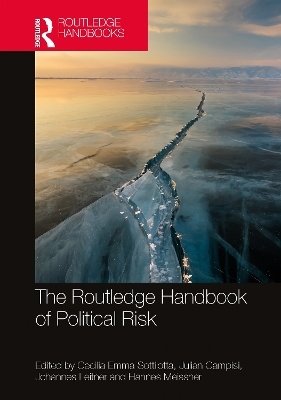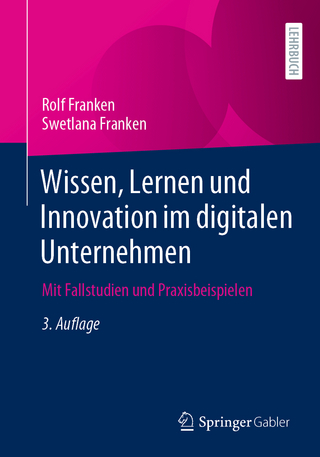
The Routledge Handbook of Political Risk
Routledge (Verlag)
978-1-032-59540-5 (ISBN)
- Noch nicht erschienen (ca. März 2025)
- Versandkostenfrei
- Auch auf Rechnung
- Artikel merken
Seasoned and emerging academics from the global north and south, alongside risk practitioners and business professionals from multiple continents and industries, reconsider and address policy-oriented questions in relation to social, political, democratic, environmental, economic, security, technological, and geopolitical challenges. Across 5 distinctive Parts, The Handbook of Political Risk considers ethical risks, populism, weaponized interdependence, protectionism, company case, industries, and political risk management, while also reconsidering the future of political risk.
The volume will appeal to scholars and students of international business and management studies, political science, area studies, security studies, geography, history, and sociology. In the absence of functioning global governance to mitigate such risks, it will also be of great use to a range of consultants, investors, business practitioners, and corporations.
Julian Campisi is an Assistant Professor, Teaching Stream at the University of Toronto -Scarborough. He completed his PhD in Political Science at York University in 2019. His research interests are predominantly in the field of international political economy and comparative politics, specifically the methodologies that underpin political risk assessments in the private and public realms, with specific interest in the Italian case. Julian was a visiting scholar in 2015-16 at LUISS University in Rome; he completed his MA at UBC Vancouver in European Studies, and his BA at U Ottawa in International Studies. Julian has worked and studied in China, Australia, and Italy over the years in a variety of industries. Currently, he teaches courses on Canadian politics, IPE, public policy, IR, and multiculturalism, in addition to providing consulting advice on geopolitical risks. Julian was a 2022 Associate Fellow at JHU SAIS Bologna, a 2021 MITACS Canadian Science Policy Fellow with the Department of National Defence, and a recent S&T Fellow with the IAI on global change research. Johannes Leitner is co-founder and Managing Partner at LM Political Risk and Strategy Advisory, a boutique-advisory firm in Austria. He is a recognized expert in the fields of geostrategy, trade compliance management, political risk management, and global business strategy with more than 15 years of professional experience. In addition, he is academic director of the EMBA program global business management at the University of Applied Science BFI Vienna. Johannes Leitner frequently leads expert and academic panels at international conferences, including, among others, at Cambridge University. He received his PhD from the Vienna University of Economics and Business and graduated in International Business Studies at the Vienna University of Economics and Business, and in Political Science at the University of Vienna. In addition, he was a visiting scholar at the Stockholm School of Economics. Hannes Meissner is a political scientist dealing with political risk analysis and political risk management of multinational enterprises with a focus on Eastern Europe, Russia, South Caucasus and Central Asia. He is Managing Partner at LM Political Risk and Strategy Advisory GmbH and an expert for (geo-)political risks in Eastern Europe, the Black Sea region, and Central Asia in the Expert Team Global Political Economy at the University for Economics, Management & Finance – University of Applied Sciences BFI Vienna. He is further more part of the Research Group Eastern Europe at the University of Vienna and associated with the University of Gothenburg in the V-Dem Project, acting as a country expert on Turkmenistan. Hannes Meissner has a doctoral degree (PhD) from the University of Hamburg. During his PhD studies, he was a PhD fellow at the German Institute of Global and Area Studies (GIGA) and furthermore engaged in the research programme "Corruption and Informal Networks" at the Research Centre for East European Studies at the University of Bremen. Hannes Meissner was a PhD scholar of the Konrad-Adenauer-Foundation (KAS) and received a full scholarship by the Federal Ministry of Education and Research of Germany. Cecilia Emma Sottilotta is an Assistant Professor of Political Science at the Department of International Human and Social Sciences of the University for Foreigners of Perugia (Unistrapg) and, since 2021, a Visiting Professor at the College of Europe, Bruges, where she teaches Political Risk Analysis in a European perspective. She completed her PhD in Political Theory at Luiss University in 2013, and between 2017 and 2022 she was Assistant Professor of International Relations and Global Politics at the American University of Rome. She has been Visiting Research Fellow at the University of Salzburg, Austria (2016), Visiting Professor at the Universidad del Norte in Barranquilla, Colombia (2017 and 2023), DAAD Visiting Research Fellow at the German Institute of Global and Area Studies - GIGA Hamburg (2019), Visiting Researcher at the Jacques Delors Centre of the Hertie School, Berlin (2021).
Lists of figures
List of tables
List of contributors
Acknowledgements
List of acronyms
Chapter 1: Introduction: Situating the Handbook of Political Risk
Part I - Theoretical and Historical Perspectives on Political Risk Analysis
Chapter 2: Re-evaluating the Theoretical Foundations of Political Risk Analysis: The Crucial Role of Context
Chapter 3: “Globalization in the First Person”: Political Risk and the Study of International Relations
Chapter 4: Political risk and Security Studies: Towards a conceptual framework of political riskiness
Chapter 5: Close Encounters, awaited appointments: Futures Studies meet Political Risk Analysis
Chapter 6: A history of political risk: Tracking the development of institutions and policies to mitigate political risk in the 17th-21st centuries
Part II - Methodologies and Approaches in the Analysis of Political Risk
Chapter 7: “Cats vs. Analysts”: Can Political Risk Analysis Be Rigorous?
Chapter 8: Political Risk Analysis as Intelligence for Contextualised and Actionable Insight
Chapter 9: How to conduct Political Risk Research in a Hybrid Regime: the Case of Zimbabwe
Part III – Political Risk as a Result of Disruptive Global Trends
Chapter 10: Understanding the Climate Change - Political Risk Nexus
Chapter 11: Artificial Intelligence and Political Risk Analysis
Chapter 12: Political Risk and the Geopolitics of Cybersecurity
Chapter 13: Missing the Risks: Ideology, Technology & the Shift to US-China Conflict, 2016-2024
Chapter 14: Localising political risk. A framework for analysing political risk associated with city diplomacy
Part IV - Geopolitics & Political Risk Constellations: Spaces and Places
Chapter 15: Political risk in Japan: Looking under the bonnet
Chapter 16: Political Risks in the post-Soviet Region: Geopolitical Risks, Country Risks, and Business Management Strategies
Chapter 17: A Political Risk Analysis of Kazakhstan: Recent Changes in the Internal and External Context of a Central Asian State
Chapter 18: Exploring Future Energy Security in the Black Sea-Caspian Region: Strategic Interests, Political Risks and Emerging Challenges
Chapter 19: Informality and State Capture as Political Risk: Firm Level Evidence from Ukraine under Yanukovych
Chapter 20: How does European strategic autonomy reduce political risk for EU businesses?
Chapter 21: Doing Business in the EU’s Electoral Autocracy: Analysing Political Risks in Hungary
Chapter 22: Between hope and despair: Political risks and opportunities for European business in Iran, 2015-2019
Chapter 23: Assessing the ‘systemic’ risks around ESG investment in Latin America
Chapter 24: Political Risk in South America: Insights for European Investors in the renewable energy and mining sectors
Chapter 25: Sink, swim or be the captain: Emerging Political Risks and their impact on Southern Africa
Part V New Trends in Political Risk Management: Industries, Companies, Strategies
Chapter 26: From Niche Market to Core Function? Mapping the Political Risk Analysis Industry
Chapter 27: Political Risk Insurance: Where does it fit?
Chapter 28: “Ethical” Political Risk: Impacts and Strategies
Chapter 29: Political risk assessment in the context of Great Power conflict: The case of the Hong Kong Stock Exchange
Chapter 30: “Political Tailwind for Chinese contractors on EU funded construction projects: Insights from the Pelješac Bridge Project”
Chapter 31: “Investment Arbitration, Political Risk and the European Union”
Chapter 32: “Geopolitics and Climate Change. How can MNEs Prepare?”
Chapter 33: “Is Geopolitics ‘Manageable’? Underlying trends, firm level responses and strategic options”
Index
| Erscheint lt. Verlag | 14.3.2025 |
|---|---|
| Zusatzinfo | 7 Tables, black and white; 12 Line drawings, black and white; 12 Illustrations, black and white |
| Verlagsort | London |
| Sprache | englisch |
| Maße | 174 x 246 mm |
| Gewicht | 453 g |
| Themenwelt | Wirtschaft ► Betriebswirtschaft / Management ► Unternehmensführung / Management |
| Wirtschaft ► Volkswirtschaftslehre ► Ökonometrie | |
| ISBN-10 | 1-032-59540-X / 103259540X |
| ISBN-13 | 978-1-032-59540-5 / 9781032595405 |
| Zustand | Neuware |
| Haben Sie eine Frage zum Produkt? |
aus dem Bereich


